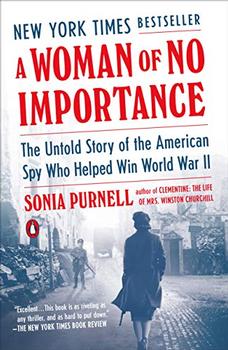Summary | Excerpt | Reading Guide | Reviews | Beyond the Book | Readalikes | Genres & Themes | Author Bio
The Untold Story of the American Spy Who Helped Win World War II

Critics' Opinion:
Readers' Opinion:
First Published:
Apr 2019, 368 pages
Paperback:
Mar 2020, 368 pages
 Book Reviewed by:
Book Reviewed by:
Valerie Morales
Buy This Book
Prologue
France was falling. Burned‑out cars, once strapped high with treasured possessions, were nosed crazily into ditches. Their beloved cargoes of dolls, clocks, and mirrors lay smashed around them and along mile upon mile of unfriendly road. Their owners, young and old, sprawled across the hot dust, were groaning or already silent. Yet the hordes just kept streaming past them, a never‑ending line of hunger and exhaustion too fearful to stop for days on end.
Ten million women, children, and old men were on the move, all fleeing Hitler's tanks pouring across the border from the east and the north. Entire cities had uprooted themselves in a futile bid to escape the Nazi blitzkrieg that threatened to engulf them. The fevered talk was of German soldiers stripped to the waist in jubilation at the ease of their conquest. The air was thick with smoke and the stench of the dead. The babies had no milk, and the aged fell where they stood. The horses drawing overladen old farm carts sagged and snarled in their sweat‑drenched agony. The French heat wave of May 1940 was witness to this, the largest refugee exodus of all time.
Day after day a solitary moving vehicle weaved its way through the crowd with a striking young woman at the wheel. Private Virginia Hall often ran low on fuel and medicines but still pressed on in her French army ambulance toward the advancing enemy. She persevered even when the German Stukas came screaming down to drop 110‑pound bombs onto the convoys all around her, torching the cars and cratering the roads. Even when fighter planes swept over the treetops to machine‑gun the ditches where women and children were trying to take cover from the carnage. Even though French soldiers were deserting their units, abandoning their weapons, and running away, some in their tanks. Even when her left hip was shot with pain from continually pressing down on the clutch with her prosthetic foot.
Now, at the age of thirty‑four, her mission marked a turning point after years of cruel rejection. For her own sake as much as for the casualties she was picking up from the battlefields and ferrying to the hospital, she could not fail again. There were many reasons why she was willingly jeopardizing her life far from home in aid of a foreign country, when millions of others were giving up. Perhaps foremost among them was that it had been so long since she had felt so thrillingly alive. Disgusted at the cowardice of the deserters, she could not understand why they would not continue the fight. But then she had so little to lose. The French still remembered sacrificing a third of their young menfolk to the Great War, and a nation of widows and orphans was in no mood for more bloodshed. Virginia, though, intended to go on to the end, wherever the battle took her. She was prepared to take whatever risks, face down any dangers. Total war against the Third Reich might perversely offer her one last hope of personal peace.
Yet even this was as nothing compared with what was to come in a life that drew out into a Homeric tale of adventure, action, and seemingly unfathomable courage. Virginia Hall's service in the France of summer 1940 was merely an apprenticeship for a near suicide mission against the tyranny of the Nazis and their puppets in France. She helped to pioneer a daredevil role of espionage, sabotage, and subversion behind enemy lines in an era when women barely featured in the prism of heroism, when their part in combat was confined to the supportive and palliative. When they were just expected to look nice and act obedient and let the men do the heavy lifting. When disabled women—or men—were confined to staying at home and leading often narrow, unsatisfying lives. The fact that a young woman who had lost her leg in tragic circumstances broke through the tightest constrictions and overcame prejudice and even hostility to help the Allies win the Second World War is astonishing. That a female guerrilla leader of her stature remains so little known to this day is incredible.
Excerpted from A Woman of No Importance by Sonia Purnell. Copyright © 2019 by Sonia Purnell. All rights reserved. No part of this excerpt may be reproduced or reprinted without permission in writing from the publisher.




Poetry is like fish: if it's fresh, it's good; if it's stale, it's bad; and if you're not certain, try it on the ...
Click Here to find out who said this, as well as discovering other famous literary quotes!
Your guide toexceptional books
BookBrowse seeks out and recommends the best in contemporary fiction and nonfiction—books that not only engage and entertain but also deepen our understanding of ourselves and the world around us.